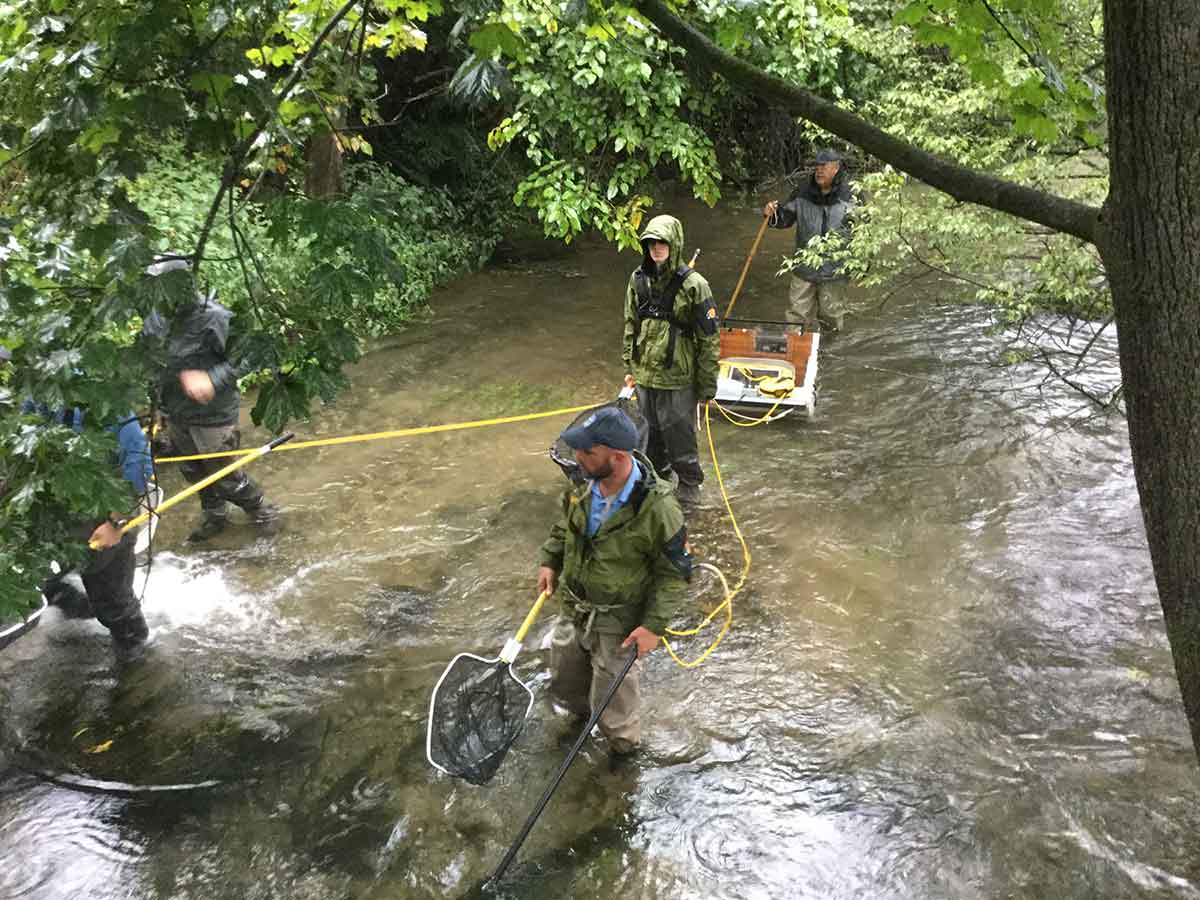
Pennsylvania Fish and Boat Commission officials seeking to raise license fees say they’re spending some of their reserve cash to hire biologists to survey lakes and streams.
Photo :PA Fish and Boat Commission
Pennsylvania Fish and Boat Commissioners are trying to meet anglers and state lawmakers halfway.
Or, well, at least 30 percent of the way.
Commission executive director Tim Schaeffer recently delivered his agency’s annual report to members of the House of Representatives game and fisheries committee. Much of his commentary – not at all surprisingly — focused on increasing the price of fishing licenses.
Those haven’t changed since 2005.
Since then, Schaeffer said, commission expenditures related to supporting fishing and boating grew by an additional $11 million annually.
“Where our revenues have remained stagnant, costs have continued to rise,” Schaeffer said. “Inflation, increased personnel costs and aging infrastructure have all placed considerable pressure on the commission’s long-term financial picture in the absence of new or increased revenue.”
A resident adult fishing license costs $22.90. Adjusted for inflation, the commission said that should have been $37.18 by 2017
Only lawmakers can increase license fees, though. And they’ve been unwilling to do so.
Most of the opposition centers around the commission’s emergency, or reserve, fund.
The commission’s annual budget usually hovers between $50 million to $55 million. In recent years, it kept almost exactly that much – enough to fund the agency for one year – in uncommitted reserve funds.
Lawmakers have been unwilling to ask anglers to pay more when the commission has that much money bankrolled.
The commission heard that and is making a change, Schaeffer said.
Commission staff spent the last few months evaluating its “risk factors,” Schaeffer said. That includes things like the loss of a major revenue source, an outage in the automated license sales system in the week or two around trout season, when sales peak, or an unforeseen infrastructure emergency, like a dam or hatchery failure.
“Based on cash flow needs and agency risk factors, it was determined that the commission should strive to maintain its unrestricted reserves at a level equal to 70 percent of prior year revenues,” Schaeffer said.
So starting this year it’s going to keep 70 percent of its annual budget – not 100 percent – in reserve. It will spend all money over and above that right away.
Already it’s recruiting a new class of waterways conservation officers, with the goal of restoring its law enforcement staff to full staff. Schaeffer said it’s also going to use reserve cash to replace hatchery trucks with more than 250,000 miles on them; replace law enforcement boats more than 30 years old; update oxygen alarms at hatcheries to save fish; repair unsafe boat ramps; and rehire seasonal biologists to help survey rivers and lakes.
None of that – nor “aggressive steps” to cut costs already taken – forestall the need for a license fee increase, though, Schaeffer said. The commission maintains it still needs more money if it’s going to continue delivering the goods and services anglers expect.
Increasing costs beyond its control are one reason, Schaeffer said. He pointed to fish food and gas prices as examples.
“We’d simply like to be able to keep up with them,” he said.
Lawmakers seem willing to help.
The state Senate actually passed a bill last year that would allow the commission to set its own prices for three years. After that time, authority would revert to lawmakers.
The bill died in the House of Representatives, however.
Now, an identical bill is expected to come out of the House. Rep. Thomas Mehaffie, a Dauphin County Republican, is going to be its prime sponsor.
If that is adopted, Schaeffer said the commission’s plans to increase resident adult license fees by $5 in year one, $2 in year two and $2 in year three. Other licenses – for non-residents, for example – would see increases, too.
“And we think that would sustain us for at least 10 years,” Schaeffer said.
He believes anglers would find such incremental increases more palatable than the larger ones traditionally implemented every 10 to 15 years. That’s also believed to be a reflection of what the market might bear price-wise.
The commission gets no general tax revenue, Schaeffer noted. It makes money only when people pay to fish and boat. So it has no intention of pricing itself out of business.
“In short, the future of our agency depends on our goods being competitively and appropriately priced, much like the private sector. The last thing we can afford as an agency is to drive away our constituents,” Schaeffer said.
Committee members – relatively few of whom fish or boat — had a few questions. But unlike in the past, none expressed opposition to increases.
That doesn’t guarantee any bill that gets out of committee will pass the House. Twelve of the 25 committee members are in either their first or second terms, so few rank high among legislative leadership.
But Mehaffie seemed optimistic, saying it’s time to raise fees in support of fishing and boating.
“Let’s get this thing done and over the finish line,” he said.
Want to see more? Check us out on Facebook, Twitter and Instagram.








